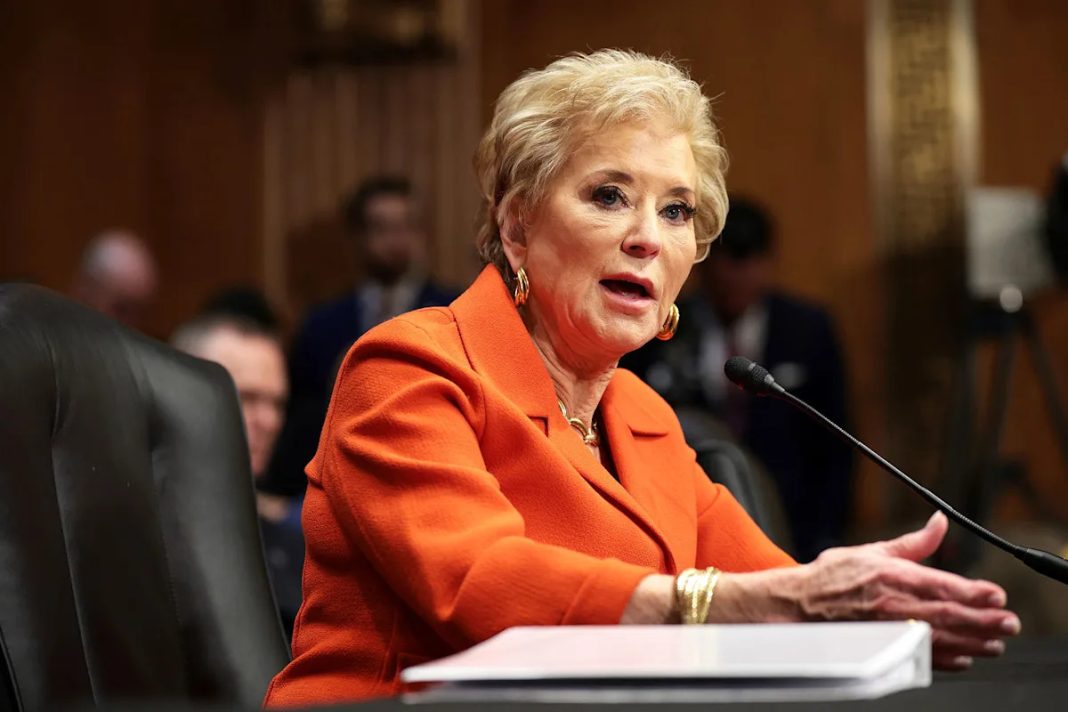Over the weekend, the Trump administration fired almost all employees in the Department of Education’s Office of Special Education and Rehabilitative Services. The mass dismissals were part of President Donald Trump and Office of Management and Budget Director Russell Vought’s attempts to pressure Democrats to cave to their demands, as the government shutdown continues. The firings also fit neatly with Trump’s track record on these issues. Throughout his career, Trump has shown little regard for people with disabilities. As president, he has sought to abolish the Department of Education and tapped Linda McMahon, a former WWE executive with scant experience in education, to neuter the department.
The administration’s decision to remove almost all personnel for the special education office is not just a betrayal of students with disabilities. It also is the final nail in the coffin for Republican support of the idea that people with disabilities can and should access public education so that they can empower themselves and live a fulfilling life.
Education for people with disabilities goes hand in hand with conservative ideals. While that may seem counterintuitive, having people with disabilities integrated into larger society is a way to reduce the chance that they have to depend on the government. Many Republicans used to recognize this. In the first year of his second term, President Richard Nixon signed the Rehabilitation Act of 1973, saying people with disabilities “will enjoy the benefits of expanded job opportunities and further steps toward independence.” Section 504 of the law explicitly prohibits any entity that receives federal dollars from discriminating against people with disabilities. In addition, the law created “504 plans,” which are meant to remove barriers to education for students with disabilities.
Two years later, Nixon’s successor, President Gerald Ford, signed the Education for All Handicapped Children Act (EHA). That law established what is now called a “Free Appropriate Public Education” for students with disabilities, and required schools to create “Individualized Education Plans” (IEP) for those students
In 1990, the same year as the passage of the Americans with Disabilities Act, George H.W. Bush signed a reauthorization of the EHA, renamed the Individuals with Disabilities Education Act (IDEA). The reauthorization included autism and traumatic brain injury as disabilities covered under the law and also mandated that IEPs individualized plans to help K-12 students transition to adult life. All of this makes sense through the lens of Republican ideology of self-empowerment and helping people with disabilities work.
President George W. Bush continued this legacy when he signed a reauthorization of IDEA in 2004, which required early intervention for students who had not been identified as having a disability but who needed additional support and required that schools be made accountable for the performance of students with disabilities.
This is not to say that Republican support always came enthusiastically. Promoting freedom and independence always existed in tension with Republican mistrust of federal oversight. Nixon vetoed initial versions of the Rehabilitation Act. Though Ford signed the EHA, he warned that “this bill promises more than the Federal Government can deliver” and that it could be undone by “the many unwise provisions it contains.” But for many years, support for these bills spanned the ideological spectrum. Sen. Bob Dole, a conservative Republican who would become Ford’s running mate in the 1976 presidential election, hailed the EHA as “a significant and needed move forward toward the goal of quality education for all children.”
These pieces of legislation represented significant milestones, and generations of students with disabilities have benefited from these laws. But Bush’s reauthorization was the last for IDEA. Like many other parts of Washington, the issue simply become too polarized.
Though it would be easy to blame Trump for Republicans’ abandonment of the principle that people with disabilities deserve a good education, GOP support began to wane long before the current president. In 1975, for example, Republican Congressman Jim Jeffords helped passed the EHA. In 2001, Jeffords, now a senator, quit the GOP to become an independent, partially because he felt that the GOP failed to live up to the federal government’s promise that it would pick up 40% of the cost for IDEA.
If Trump and Vought succeed in gutting of the office overseeing special education, they will end a decades-long record of achievement of which the GOP could be justifiably proud. Republicans used to understand that special education isn’t just something nice thing to have. It isn’t charity. It is a right. Republican presidents signed the bills that codified the right to a Free Appropriate Public Education for millions of Americans. Now, the White House’s cuts risk the freedom and liberty for people with disabilities that took the better part of 50 years to build.
This article was originally published on MSNBC.com

